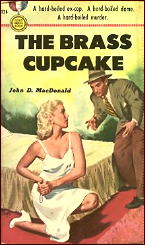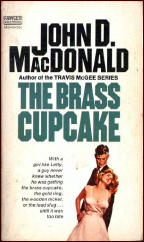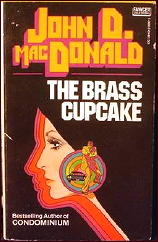Mon 23 Aug 2010
A 1001 MIDNIGHTS review: JOHN D. MacDONALD – The Brass Cupcake.
Posted by Steve under 1001 Midnights , Reviews[3] Comments
by Marcia Muller:
JOHN D. MacDONALD – The Brass Cupcake. Gold Medal #124, paperback original, 1950. Reprinted many times.

The career of John D. MacDonald has been a long and varied one, beginning with the publication of this excellent first novel. His books have ranged from modest paperback originals to the immensely popular Travis McGee series, as well as fat best sellers such as Condominium (1977) and the recent One More Sunday (1984).
Likewise, the quality of his work has varied, from the truly terrible Weep for Me (a 1951 original that MacDonald himself refuses to allow to be reprinted) and the boring small-town drama Contrary Pleasure (1954), to such outstanding novels of suspense as The Damned (1952), Murder in the Wind (1956), and The Last One Left (1967).
The recurring theme in MacDonald’s work is corruption — personal, corporate, societal-and his heroes are men and women who pit themselves against it. MacDonald draws heavily upon his knowledge of finance, land development, and Florida politics in constructing intricate plots, and his novels, particularly the later ones, are filled with editorial tirades about the abuse of the environment, corporate greed, personal greed, or whatever else happens to have been bothering him at the time of writing.

In the earlier novels, these statements of position seem a natural outgrowth of the narrators’ personalities, but in later books they become long-winded and intrusive.
In The Brass Cupcake, the evil is police corruption. The hero, Cliff Bartells, now an insurance adjuster, was once on the Florence City, Florida, force, but lost his badge for not going along with the local “arrangements” between the police and gambling establishments.
That badge — fancy and gold — is Bartells’ brass cupcake: “Anything you got by guile … was called a cupcake So when they took it away from me, it wasn’t even a badge any more. Just a cupcake. Something I chiseled and then got chiseled out of. A brass cupcake. Something of no importance.”
The murder with which the story opens — the death of a wealthy old woman in the process of a jewel theft — pits Bartells against the police force he used to belong to. They want him to keep out of it; he wants to follow the insurance agency’s usual procedure of attempting to buy back the jewels.

His motives are not so pure, however — there is a fat bonus for him if he manages this. But Bartells is up against more than he bargains for: The dead woman has a lovely niece, someone Bartells can’t look at in a purely professional way; the niece has a boyfriend who is little more than a gigolo; a pair of servants seem to know more about the theft than they claim to the police.
By the time Bartells has sorted through the evidence — as well as his personal feelings on a number of issues — a second murder has occurred, shots have been fired at him, and he knows his future in Florence City is not promising. Unless …
Cliff Bartells is an early version of MacDonald’s later male characters: a complex man who wants to do the right thing and worries about it, because he knows he himself is not incorruptible.
And in the niece, Melody Chance, we see many of the same qualities that appear in later women characters: strength, independence, and straightforwardness, a woman just a trifle weary of life who would like a good man to occasionally lean on.
MacDonald’s depiction of secondary and even incidental characters is also excellent.
———
Reprinted with permission from 1001 Midnights, edited by Bill Pronzini & Marcia Muller and published by The Battered Silicon Dispatch Box, 2007. Copyright © 1986, 2007 by the Pronzini-Muller Family Trust.
Previously on this blog —
April Evil (reviewed by Steve Lewis)
Linda, film and novella (reviewed by Steve Lewis)
August 23rd, 2010 at 10:11 pm
This is interesting in part because you can see the early use of themes and characters that JDM will expand and deepen in later works already present and being developed.
One element of JDM that is present here that is one of the great themes of American literature is the ‘one good man theme.’ In JDM’s novels the hero may not be perfect, and he doesn’t always win a clear cut victory, but he does stand up to be counted, and does achieve at least a moral victory.
August 24th, 2010 at 4:37 pm
I’m sure I’ve read that THE BRASS CUPCAKE is the closest that JDM came to writing to writing a private eye novel. I’ve not read all of JDM’s work, but I can’t think of any major character that comes closer than Cliff Bartells.
— Steve
August 24th, 2010 at 10:17 pm
Steve
The hero of THE DROWNER is a private eye or insurance investigator if I recall correctly, though I have heard this claim for THE BRASS CUPCAKE before. THE DROWNER was even done as an episode of KRAFT SUSPENSE THEATER (Jan. 2, 1964) as THE DEEP END, with Aldo Ray, Tina Louise, and Ellen Burstyn, and Clu Gulager as Dan Walsh, who is either a private investigator or insurance investigator.
I don’t think the adaptation or the title variation is mentioned in Hubin, and IMDb does not mention it is THE DROWNER, but I remember seeing this one, and the hero of THE DROWNER is Dan Walsh a non police investigator who is either a private eye or insurance investigator.
Also, the hero of MURDER IN THE WIND is a government investigator working undercover and operating much like a private eye.